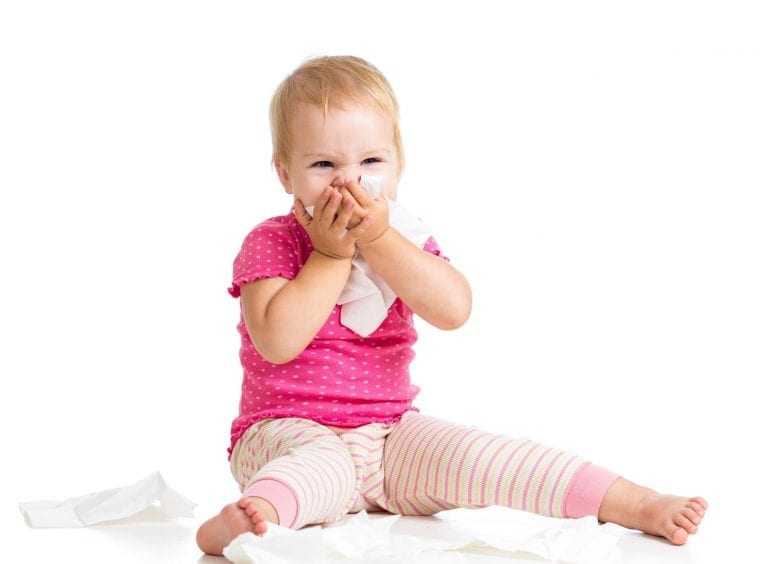Cold vs Allergy
It’s spring and your little one seems stuffy and fussy; and this is not the first time. You’ve been sneezing as well and are left wondering: could this be an allergy vs cold?
Allergies typically don’t occur in children ages 3 or younger because it takes repeated seasonal exposure to pollen and other allergens to create an allergic response, says the American Academy of Pediatrics. Cold and allergy symptoms may appear similar so begin with your child’s age: The younger they are, the less likely they have an allergy. The common cold is actually a viral infection in your little one’s upper respiratory tract. Most infants will have up to 7 colds in the first year of life.
The drainage coming from your child’s nose can also be telling: Colds generally have thick, colored drainage, while nasal secretions are typically clear and runny with an allergy. As always, it’s best to get your pediatrician’s expert advice. And refrain from giving any over-the-counter medications designed to relieve symptoms related to colds or allergies to infants and young children unless advised by your child’s healthcare provider—regardless of what the packaging says.
Colds
If your child is 3 months old or younger, let your pediatrician know baby isn’t well; colds in very young babies can easily progress to more troublesome infections, such as an ear infection or pneumonia.
Know the Signs
- Stuffy nose, with typically thick, yellow or greenish fluid draining
- Cough or sneeze, especially with mucous
- Temperature up to 100.4˚F
- Fussiness, irritability
- Difficulty sleeping
- Decreased feeding
How To Help
- Keep baby’s hands cleans
- Gently clear baby’s nose of any drainage
- Keep baby’s nose moist with saline sprays or drops made for infants
- Keep the air moist with a cool mist humidifier
- A warm bath can also help with stuffiness
- Nurse often to keep baby hydrated; give breast milk or water often to infants ages 6 months+ who are no longer nursing
Allergy
If child is age 3 or older, you could be dealing with a seasonal allergy.
Know the Signs
- Stuffy nose, with clear fluid draining
- Cough or sneeze, with clear mucous
- Water, irritated-looking eyes
- Difficulty sleeping
- Decreased feeding
- Symptoms get worse at the end of the day, particularly in the spring or fall
How To Help
- Depending on your child’s age and how severe their allergies are, your pediatrician may advise using nasal decongestants or antihistamines; corticosteriods are also often used but are available by prescription only.
- Keep your child indoors in the evening, when allergen levels are highest
- Keep your house and car windows closed to keep allergens out
- Bathe your child often, especially after being outdoors
- Wash jackets and hats often to remove pollens and other allergens
- Use a clothes dryer instead of drying clothes outside
Tell your pediatrician if your child…
- Has symptoms and is 3 months old or younger
- Has a temperature greater than 100.4˚F
- Is pulling on her ears
- Isn’t using as many diapers, or the toilet, as typical
- Has had a stuffy nose with drainage for more than a week
- Has been coughing for a week
- Has gooey eye discharge
ALSO READ:
Debunking the Myths About Vaccinations
What to Do about Allergies, Colds and the Flu






Comments are closed.